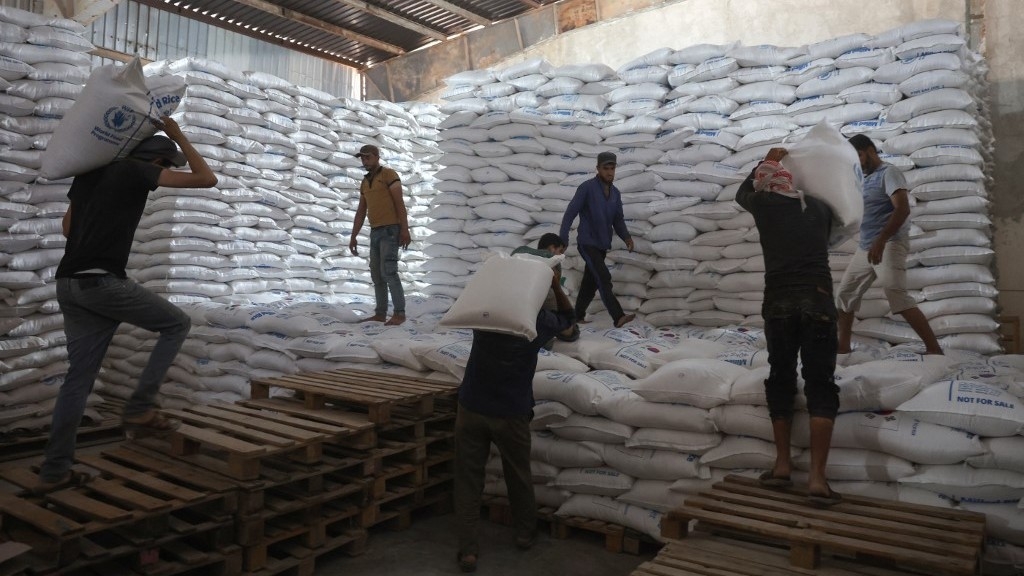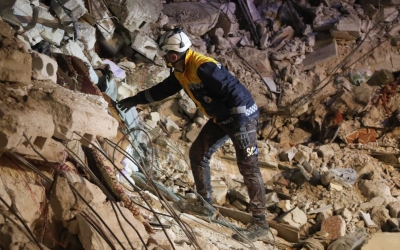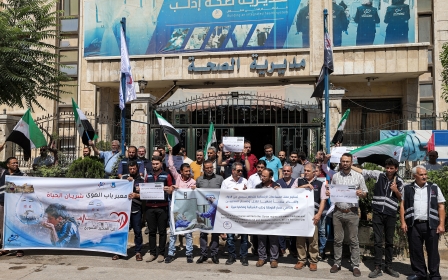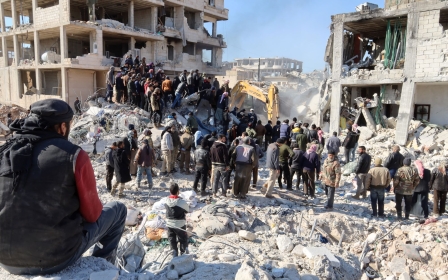Syrians condemn UN aid deliveries in 'coordination' with Assad government

Humanitarian deliveries will be allowed to be sent through a key crossing point from Turkey into northwest Syria, but only under the condition that they must be made in "full cooperation and coordination with the Syrian government".
The decision by Syria, which was sent in a letter to the United Nations Security Council by Syria's ambassador to the UN, Bassam Sabbagh, on Thursday, will allow the Bab al-Hawa border crossing to be used for another six months, after Russia blocked a proposed nine-month extension at the Security Council.
Both the short extension and the condition to fully cooperate with the Syrian government have raised concerns amongst people in Syria and aid organisations.
Sherine Ibrahim, the Turkey country director for Care, an international humanitarian organisation, said the non-renewal of the previously operating cross-border aid mechanism could have serious implications.
"Bilateral agreements put power and control in the hands of a few parties, making such agreements inherently subject to far more influence by competing political interests and often come with little transparency,” she said in a statement to Middle East Eye.
Since the beginning of the Syrian war in 2011, more than 300,000 civilians have been killed, with some 14 million people displaced from their homes.
Northwest Syria is home to 4.4 million people, including more than two million internally displaced people, according to UN figures. Almost 70 percent of the population is in acute need of humanitarian assistance.
The Bab al-Hawa crossing on the Turkish border is the key lifeline for humanitarian aid entering northwest Syria, though the Syrian government has permitted UN aid through two other crossings since a devastating earthquake struck the area in February, and deliveries through these can continue until 13 August.
Syrian government ‘sending a message’
The Syrian government decision has stirred anger on the ground in Syria.
Ibrahim Ahmed al-Youssef, a 26-year-old from the Atma refugee camp in northwest Syria, has called on the UN to not cooperate with the Syrian government because "it makes you partners in this crime".
'We prefer that all aid be cut off if it needs to enter through the Syrian government, because it would be stained with the blood of Syrian people'
- Ibrahim Ahmed al-Youssef
"When I hear that the UN and Turkey are bringing aid through the criminal regime, it feels the same as someone who has had family members killed and expelled by the government and is then asked to come and reconcile with it," he told MEE.
"Obviously we'd rather die than reconcile with the criminal regime."
In the camps, Youssef said, the sentiment is that people "prefer that all aid be cut off if it needs to enter through the Syrian government, because it would be stained with the blood of Syrian people".
The British UN ambassador, Barbara Woodward, issued a statement highlighting the importance of ensuring aid is not misused.
"Without UN monitoring, control of this critical lifeline has been handed to the man responsible for the Syrian people's suffering," she said, in a reference to Syrian President Bashar al-Assad.
Abd al-Karim al-Amr, a 40-year-old political activist from Idlib, said that the Syrian regime has "sought to make the issue of aid political".
"The Syrian government wants to send a message that it is in control and they are above everything, and that they are aware of the situation in northwest Syria, despite them being the ones who expelled them from their villages and killed them," he said.
This is not the first time the Syrian government has sought to control aid entry into the country.
When the Turkey-Syria earthquake struck in February, the Syrian government was quick to control what aid reached certain areas, Amr said.
"At the time there was a decision by the Security Council for aid to enter the earthquake-affected areas through two crossings, but the Syrian government issued a statement and hastened to take control politically and in a humanitarian capacity," he said.
Molham Team, a charitable organisation founded by Syrian students, said that if the Syrian decision was to go through, "significant harm would be inflicted upon northern Syria".
"We do not expect that if the Assad regime were to gain control of the crossing, aid would be delivered properly and efficiently. We have all witnessed and heard about their methods of stealing aid, including the recent incidents of earthquake relief aid reaching their areas from other countries," a spokesperson told Middle East Eye.
‘Systematic corruption’
Getting aid into Syria has long been a complicated process.
The Bab al-Hawa crossing, which is at present the only border crossing between Turkey and opposition-held territory, has been described as a "lifeline" by the UN for the four million people in Syria's Idlib province.
Syrian opposition figures have long argued that any aid sent through official UN agencies to the country would only end up in the hands of the Assad government, which, as the official representative of Syria to the UN, would ultimately decide where the aid is directed.
A report released in October found "systemic" corruption in UN humanitarian aid to Syria, with individuals accused of human rights abuses benefiting from procurement contracts with the international body.
Between 2019 and 2020, nearly 47 percent of UN procurement funding in Syria went to businesses tied to human rights abuses committed by the Assad government, according to the report by the Syrian Legal Development Programme and the Observatory of Political and Economic Networks.
The authors found that Damascus kept 51 cents of every international aid dollar spent in Syria in 2020.
Syrian government blocking UN aid
Earlier this year, Middle East Eye revealed that the Syrian government obstructed rescue efforts in the northwest after the February earthquake because it did not ask for international emergency response teams to be deployed to opposition-held areas.
The earthquake flattened large areas of northwestern Syria, with one of the worst-hit regions being the opposition-held enclave, including Idlib and parts of Aleppo province, where at least 4,191 people were killed, according to the Syrian Network for Human Rights.
However, the lack of immediate UN-coordinated response prompted angry criticism as families were left to fend for themsleves.
Documents showed that UN and Syrian officials discussed sending aid convoys - but not search and rescue teams - into opposition-held areas in the days after the earthquake.
A legal expert told MEE that the Syrian government's failure to request or facilitate the deployment of rescue teams to opposition-held territory may be in breach of the Geneva Conventions guaranteeing humanitarian actors access to conflict zones.
"If the Syrian authorities refused these teams entry into areas beyond their control, this is an arbitrary rejection prohibited by international law," said Sama Kiki, executive director of the Syrian Legal Development Programme, a UK-based legal advocacy organisation.
Middle East Eye propose une couverture et une analyse indépendantes et incomparables du Moyen-Orient, de l’Afrique du Nord et d’autres régions du monde. Pour en savoir plus sur la reprise de ce contenu et les frais qui s’appliquent, veuillez remplir ce formulaire [en anglais]. Pour en savoir plus sur MEE, cliquez ici [en anglais].





